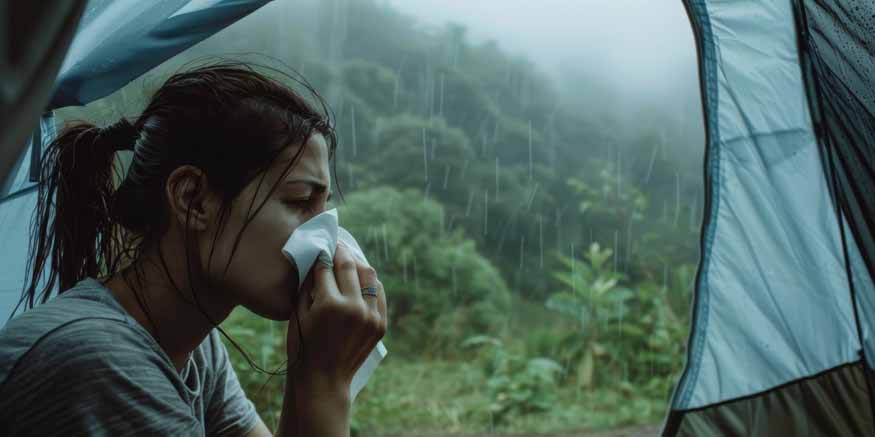A Parent’s Guide to Managing Seasonal Allergies in Children during the Monsoon

The onset of the Monsoon heralds a season of delightful weather- a stark contrast to the hot summer months that precede it. However, the monsoons also bring weather conditions likely to spread disease and germs. The humidity and moisture in the air facilitates the growth of mould, dust mites and fungus, often aggravating allergies in children.
Although seasonal allergy symptoms are not always dangerous, they do cause undue discomfort to children. Of course, if severe allergies are left untreated for long periods of time, they could lead to other diseases and illnesses.
For parents, recognizing the signs of seasonal allergies early on is crucial. This will help you take proactive steps to ensure your child’s comfort and good health throughout the season. In this blog, we will explore everything you need to know to navigate monsoon allergies with confidence.
Understanding Seasonal Allergies In Children
Seasonal allergies are often triggered by pollen, dust mites, and mould spores. These can manifest in various ways in your children. Common seasonal allergy symptoms can include itchy eyes, coughing, sneezing, runny or stuffy noses, and skin rashes. These symptoms can disrupt your child’s daily life – affecting their comfort, concentration and even their sleep.
Identifying Allergies in Children
Recognising allergies in children can be challenging at times. Very often, the symptoms may mimic a common cold. However, seasonal allergy symptoms are more likely to last longer than a cold, and the symptoms generally grow in severity. Seasonal allergies usually surface around the same time each year, so if your child faces recurrent symptoms, you must consult a paediatrician.
Tips on How to Manage Seasonal Allergies Efficiently
A multifaceted approach is the best way to manage seasonal allergies – one that includes reducing exposure to possible irritants, as well as boosting your child’s immunity. Here are some tips that you can follow to ensure your child’s well-being:
- Maintain a Healthy Diet and Proper Hydration:
- Create a Neat and Clean Environment at Home:
- Take Precautions For Outdoor Activities:
- Practise Hygienic Habits:
- Consultation with Your Healthcare Professional:
A balanced diet that is rich in vitamins, omega-3 fatty acids, and antioxidants will help to strengthen your child’s immunity. Ensure they drink plenty of water, as it helps decrease sinus and congestions, and aids the immune system in fighting allergens. Caution them about staying away from street food during this season.
Allergies arise because the body reacts negatively to certain elements within an environment. Therefore, ensuring your home is kept clean and dust-free can greatly help reduce the risk of allergies in children. Simple practices like keeping windows closed, or using air purifiers can help contain pollen and dust in the air. Regularly cleaning floors and surfaces, and frequently changing bed linen can help to decrease dust accumulation around the house. Allergen-proof mattresses and pillow covers are also very useful during the season as they are designed to keep out dust mites.
Stepping outdoors in the monsoon season requires some amount of planning. Ensure your children wear soft, breathable fabrics, and clothes that cover their hands and legs. This can help prevent a skin allergy during the rainy season. Always ensure that they wear raincoats while it’s raining, and that they change out of damp clothes as soon as possible. When it isn’t raining, the sun can be quite strong even in the monsoons. It is therefore advisable that they wear hats to protect them from the heat, and sunglasses to protect their eyes from allergens present in the air.
Introduce your kid to healthy practices during monsoon. This includes washing their hands after various outdoor activities and before all meals. They must be encouraged to bathe daily, and change their clothes when they return from any outdoor activities.
If a severe case of seasonal allergy symptoms arises, a professional healthcare provider can conduct allergy tests to pinpoint specific triggers and recommend appropriate treatments.
Allergies in children can be extremely uncomfortable for children and parents alike. Taking proactive action to reduce the exposure to allergens and boost your child’s immunity during the season will greatly help with their overall wellbeing.
At Billabong High International School, we believe that children should learn about ensuring their own health and wellbeing, along with excelling in academics. Our holistic curriculum is designed to integrate lessons on wellbeing into everyday classroom activities. Visit our website today for more information.













